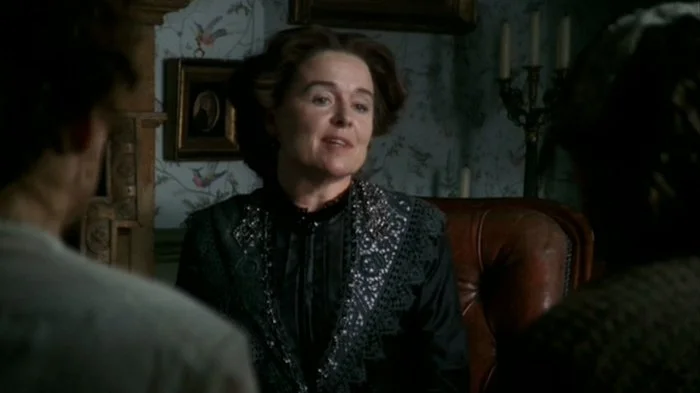Known mostly for its serious setting, conflicts, and a slew of character deaths, North and South isn’t heralded for its humor. But there are moments of humor that lighten all that seriousness.
It’s safe to say that Fanny Thornton takes first prize as comic relief in the film adaptation. Mr. Bell and Nicholas Higgins would be the runners up with their teasing remarks and sly smiles.
It’s not hard to find the moments of levity in the film version, but is there any humor in Gaskell’s book? Let’s take a look at a few instances of humor you might have missed or forgotten about in the original text.
Gaskell loves to make subtle (or not so subtle!) jabs at how silly we can be in our stubborn pride, arrogance, and self-justification. We’re often ignorant of own close-minded perspectives and one-sided emotional reactions. Gaskell very often points out the ludicrous self-absorption and self-coddling of the class of women who have no financial worries.
Here’s John Thornton making a jab at his sister. Her reply is so very…Fanny!
“Well! here is Fanny, then, who is seldom without an ailment. She will be able to suggest something, perhaps—won’t you, Fan?”
“I have not always an ailment,” said Fanny, pettishly; “and I am not going with mamma. I have a headache today, and I shan’t go out.”
And here is Edith, revealing to the reader how wrapped up she is in her own little world, unaware of the tremendous emotional and spiritual mind shift going on in her cousin:
Henry: The sea has done Miss Hale an immense deal of good, I should fancy….She looks ten years younger than she did in Harley Street.”
“That’s the bonnet I got her!” Edith said triumphantly. “I knew it would suit her the moment I saw it.”
Mr. Bell makes witty remarks throughout the book. He seems to operate on humor and sarcasm wherever he goes. I like this instance where Mr. Bell’s scathing sarcasm throws Henry’s arrogance back into his face:
Henry: …the truth is, these country clergymen live such isolated lives—isolated, I mean from all intercourse with men of equal cultivation with themselves, by whose minds they might regulate their own, and discover when they were going too fast or too slow—that they are very apt to disturb themselves with imaginary doubts as to the articles of faith, and throw up certain opportunities of doing good for very uncertain fancies of their own.”
“I differ from you. I do not think they are very apt to do as my poor friend Hale did.” Mr. Bell was inwardly chafing.
“Perhaps I used too general an expression in saying “very apt.” But certainly, their lives are such as very often to produce either inordinate self-sufficiency, or a morbid state of conscience,” replied Mr. Lennox with perfect coolness.
“You don’t meet with any self-sufficiency among the lawyers, for instance?” asked Mr. Bell. “And seldom, I imagine, any cases of morbid conscience?”
Touché, Mr. Bell! What a pompous ass Henry is in assuming he knows the mindset of all country vicars!
Of course, it’s easy to poke fun at people who are overly serious. Although in the film adaptation, Hannah Thornton has a few humorous exchanges with her son, I don’t find Mrs. Thornton to be lighthearted in the novel. She takes herself so very seriously! On my most recent reading of the book, I had to laugh out loud at a comment Mrs. Thornton made that I swear I had overlooked before.
When Fanny and her mother make their social call to Mrs. Hale and Margaret, Mrs. Thornton defends her Milton pride. In the book, Mrs. Thornton hints that Margaret should get to know her new town:
Do you know anything of Milton, Miss Hale? Have you seen any of our factories? Our magnificent warehouses?
Magnificent warehouses?! Ha ha ha! I’m sure that’s the first stop on the great Milton tour that new visitors take! I can understand that seeing the factories may be fascinating and pivotal in understanding the mill town. But I’m not sure gazing upon the gigantic warehouses sounds like an exciting venture. Only Mrs. T would think of bragging about those! For North and South fans, I think “Have you seen our magnificent warehouses?” rivals the “boiled potatoes” line from Pride and Prejudice (2005 movie)!
Mrs. T is so serious, she doesn’t realize how close-minded she’s become. I found the following exchange between Margaret and her future mother-in-law to be a hoot!
“But, surely, if the mind is too long directed to one object only, it will get stiff and rigid, and unable to take in many interests,” said Margaret.
“I do not quite understand what you mean by a minds getting stiff and rigid….”
Now, I don’t know if Gaskell meant it to be funny, but I find myself smiling with great amusement at the stabs of jealousy that knock John sideways for a few moments during conversations:
Who is Captain Lennox? asked Mr. Thornton of himself, with a strange kind of displeasure, that prevented him for the moment from replying to her!
________________________________________________
Henry (talking to Thornton): …she is much stronger. Last autumn she was fatigued with a walk of a couple of miles. On Friday evening we walked up to Hampstead and back.
John (internally): “We!” Who? They two alone?
And last but not least, let’s not forget the playful banter between John and Margaret on the very last page. As soon as it’s understood that their love is mutual, John teases her, calling her “Vanity” and making her “pay” for the pressed flowers from Helstone! Then after some snogging, they tease each other about how their relatives will accept their announcement. It’s adorable. Who would have imagined such a serious book to end with a few lines of humor?
So what are your favorite comic moments in North and South? Are there any lines from the book that make you smile or laugh out loud?


